Related Research Articles
Prithvi Theatre is a theatre located in the upscale neighbourhood of Juhu, Mumbai. Prithviraj Kapoor the spearhead of one of the most influential actor and director families in Bollywood, the Kapoor family, founded the travelling theatre company 'Prithvi Theatres' in 1944 and the company ran for sixteen years. The theatre was built by Shashi Kapoor and his wife Jennifer in memory of Prithviraj, Shashi's father, who had dreamt of having a "home" for his repertory theatre company. It was designed by architect Ved Segan and opened in 1978. The building and running of the theatre was supervised by Jennifer until her death in 1984. Shashi Kapoor was the theatre's Managing Trustee and the daily affairs were looked after by trustee Kunal Kapoor with a small but efficient team.

Theatre of India is one of the most ancient forms of theatre and it features a detailed textual, sculptural, and dramatic effects which emerged in mid first millennium BC. Like in the areas of music and dance, the Indian theatre is also defined by the dramatic performance based on the concept of Nritya, which is a Sanskrit word for drama but encompasses dramatic narrative, virtuosic dance, and music. Historically, Indian theatre has exerted influence beyond its borders, reaching ancient China and other countries in the Far East.

Mareez, born Abbas Abdul Ali Vasi, was a Gujarati poet, mainly popular for his Ghazals. He is popularly known as Ghalib of Gujarat. He left studies in young age and started working in rubber shoe factory. Having been interested in poetry, he took up journalism but remained financially unstable throughout his life. He wrote Ghazals published in collections but many of his works remained uncredited which he sold during his financial difficulties. His popularity escalated after his death.
Mahesh Dattani is an Indian director, actor, playwright and writer. He wrote such plays as Final Solutions, Dance Like a Man, Bravely Fought the Queen, On a Muggy Night in Mumbai, Tara, Thirty Days in September 2007 and The Big Fat City.
The Works of Narmadashankar Lalshankar Dave, popularly known as Narmad, consist essays, poems, plays and other prose were published in collections by Gujarati. He is considered as the founder of modern Gujarati literature.

Manoj Sakarchand Shah is an Indian theatre director, actor and producer known for his works in the Gujarati theatre. He has directed over 90 plays, such as one-man plays and biographical plays, in different genres. He is known primarily for his quirky biographical plays which include: Hu Chandrakant Bakshi based on the writer of the same name, Mohan No Masalo based on Mahatma Gandhi, Apurva Avsar based on Jain mystic Shrimad Rajchandra, Mareez based on poet Mareez, Jal Jal Mare Patang based on writer-philosopher Manilal Dwivedi, Karl Marx in Kalbadevi based on German philosopher Karl Marx, and Dr. Anandibai Joshi: Like, Comment, Share based on Anandi Gopal Joshi, India's first female doctor. He produces plays under his theatre company Ideas Unlimited.

Golkeri is a Gujarati comedy drama film directed by Viral Shah and produced by Manasi Parekh and Parthiv Gohil under banner of Soul Sutra Studio. It is written by Viral Shah and Amatya. The film starring Malhar Thakar and Manasi Parekh is a remake of 2017 Marathi film Muramba.
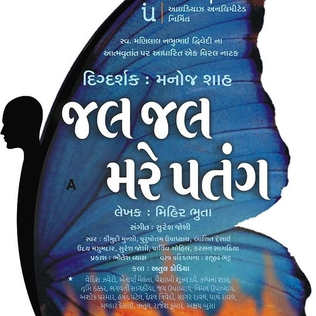
Jal Jal Mare Patang is a 2009 Gujarati language biographical play that was written by Mihir Bhuta and directed by Manoj Shah. The play depicts the life of 19th-century Indian writer and philosopher Manilal Dwivedi (1858–1898).

Mohan No Masalo is a 2015 biographical one-man play about Mahatma Gandhi, starring Pratik Gandhi. Written by Ishan Doshi and directed by Manoj Shah, it depicts the early life of Mohandas Gandhi. First performed in Gujarati, the play later staged in English and Hindi. It was included in the Limca Book of Records for its performances in three languages in a single day.
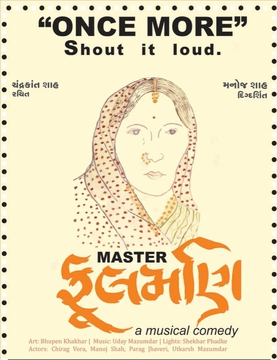
Master Phoolmani is a 1999 Gujarati-language musical comedy play that was written by Chandrakant Shah and directed by Manoj Shah. The play was adapted from Satish Alekar's work Begum Barve (1979), which Chandrakant Shah rewrote from a Gujarati viewpoint to be more relatable to Gujarati audience. The play, which is one of Manoj Shah's best-known works, was first staged on 15 November 1999 at Horniman Circle Gardens, Mumbai. It was influenced by the Bhangavadi theatre style, and depicts the story of two out-of-work theatre actors who enter the fantasy of two aged bachelor clerks.
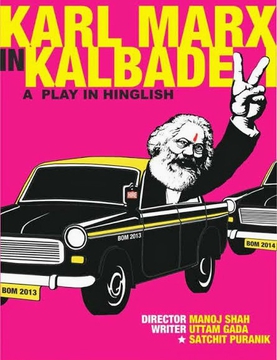
Karl Marx in Kalbadevi is a 2013 one-man play about the German philosopher Karl Marx played by Satchit Puranik. Written by Uttam Gada and directed by Manoj Shah, the play depicts an imaginary visit by Marx to Kalbadevi, the hypercapitalist area of Mumbai, India. The play tried to introduce to a commercially-minded Gujarati community the ideas of a radical critic of capitalist society, in a style that adopts song, dance, repartee, and interactive badinage with the audience to make his complex ideas more suitable to the taste and cultural background of local audiences.

Hu Chandrakant Bakshi is a 2013 biographical one-man play about Gujarati writer Chandrakant Bakshi, starring Pratik Gandhi. The play is written by Shishir Ramavat and directed by Manoj Shah. It was premiered on 15 June 2013 at Prithvi Theatre, Mumbai.
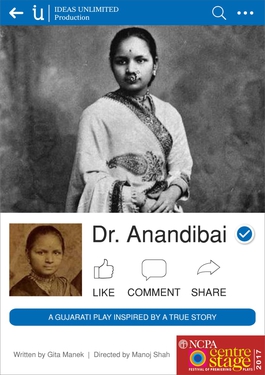
Dr. Anandibai Joshi is a 2017 Gujarati-language one-man play about Anandibai Joshi (1865–1887), first Indian woman physician, written by Gita Manek and directed by Manoj Shah. Mansi Prabhakar Joshi played the role of Anandibai in the production. The play premiered on 2 December 2017 at the National Centre for the Performing Arts, Mumbai for its Center Stage Drama Festival 2017. Unlike Shah's other one-man plays, this play features a woman character for the first time. It was later staged in Hindi and Marathi language.
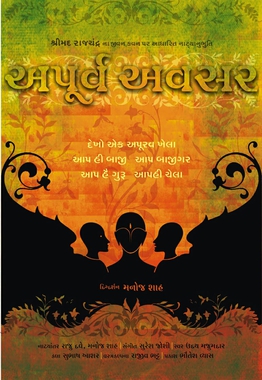
Apurva Avsar is a 2007 biographical play about an Indian Jain philosopher and mystic Shrimad Rajchandra directed by Manoj Shah. The play is co-written by Shah and Raju Dave.
Ashish Kakkad was an Indian film director, writer, actor and voice artist from Ahmedabad, Gujarat. He primarily worked in the Gujarati cinema.
Chasani, is a 2019 Indian Gujarati film directed by Abhinn Sharma and Manthan Purohit. The film is produced by Jayesh Patel, Munna Shukul and Shikha Sharma under the banners Sagar S Sharma Productions and Shukul Showbiz. Veer Vashisht has written the story. The film has an ensemble cast of Manoj Joshi, Sejal Shah, Divyang Thakkar, Maira Doshi and Ojas Rawal.

Bombay Flower is a 2023 play about Ruttie Petit Jinnah, wife of Muhammad Ali Jinnah, written by Geeta Manek and directed by Manoj Shah.

Kasoombo is an Indian Gujarati historical drama film directed by Vijaygiri Bava. It stars Raunaq Kamdar, Dharmendra Gohil, Darshan Pandya, Chetan Dhanani, Shraddha Dangar, Monal Gajjar and Firoz Irani in principal roles. It was released on 16 February 2024. and The film was officially released in Hindi language across India on 3 May 2024.
References
- 1 2 Phukan, Vikram (26 June 2019). "Existential parables and tortured souls". The Hindu. Archived from the original on 15 October 2020. Retrieved 26 October 2020.
- 1 2 Vashi, Ashish (26 March 2011). "Play on 'Ghalib of Gujarat' holds Amdavadis spellbound". The Times of India. Archived from the original on 30 June 2018. Retrieved 24 October 2020.
- 1 2 Bhayani, Utpal (2005). Rangbhoomi 2004: Reviews of Dramas Performed on Stage in Different Languages and Other Articles on Theatre During 2004 (in Gujarati). Mumbai: Image Publication Pvt. Ltd. pp. 29–30. ISBN 81-7997-188-0.
- ↑ "Mareez (Gujarati play)". Indian Express. 3 February 2012. Archived from the original on 27 October 2020. Retrieved 24 October 2020.
- ↑ Punjani, Deepa. "Mareez Play Review". www.mumbaitheatreguide.com. Archived from the original on 26 October 2020. Retrieved 24 October 2020.
- ↑ Soni, Nikunj (11 May 2023). "Heirs of iconic Gujarati poet Mareez issue public notice". Ahmedabad Mirror. Archived from the original on 11 May 2023. Retrieved 11 May 2023.